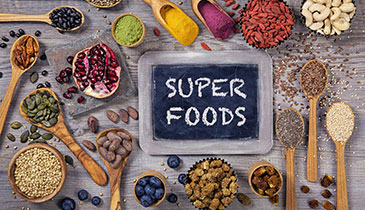 Source: Food Matters
Source: Food Matters
You’ll find no shortage of celebrities endorsing various superfoods all over the world wide web and their social media accounts; which is all well and good until you get a closer look at the price of these super-expensive life enhancers!
You don’t need to burn a hole in your wallet to achieve a healthy and balanced diet. Keep reading for some delicious, healthy, and very affordable alternatives to so called superfoods! I like to call them Supercharged Foods.
Many of you may be wondering, what makes a food a ‘superfood’? Well, to be honest, there’s no concrete definition; however, the name ‘superfood’ is actually a marketing term, not a scientific one. A superfood is described as being any food that contains high levels of antioxidants, flavonoids, vitamins and minerals. Antioxidants are well known for their ability to strengthen the immune system, thereby warding off diseases, such as heart disease and diabetes.
The health benefits of these ‘superfoods’ are the result of studies done on specific essential nutrients that are known to prevent disease and improve immunity, and the foods that they can be found in, in large amounts. If studies show that a specific food contains high concentrations of antioxidants, trace minerals and vitamins, such as Vitamin C, K and B, it can then be referred to as a superfood.
Each time a new study is released shedding light on the health benefits of a specific food, the media runs with this information, publishing their own news stories about these newly researched superfoods.
In 2014 kale farmers struggled to keep up with the new demand for kale after several studies reported that kale contained high levels of antioxidants and other essential nutrients, leaving many supermarkets out of stock.
The media has a lot of influence over consumers, and with consumers becoming increasingly aware of the benefits of eating healthy, wholesome foods, it’s no surprise that supermarkets take advantage of this by drastically increasing the price of these foods!
However, some studies can be misleading, and the results reported can be misinterpreted by the media and consumers.
Just because studies have reported that a specific food, such as blueberries, contain large amounts of antioxidants, it doesn’t mean that you have to start eating blueberries every day to maintain vibrant health.
Superfoods aren’t the only foods that contain essential nutrients.
And by eating a balanced diet that is full of variety, you can guarantee that you’re eating enough essential nutrients without even picking up a superfood.
It’s safe to say that the superfoods market is booming, and supermarkets and pharmaceutical companies are taking full advantage of it. But the hype of superfoods tends to shine a negative light on many other beneficial wholefoods.
Apples and oranges are neglected for berries, rice and pasta are replaced with teff and ancient grains…
But why should superfoods be thought of as healthier than other unprocessed foods or Supercharged Foods? Is it because they cost more in the supermarket? Or maybe it’s because the local news reported a story about kale, but not English spinach.
The take home message here is fill your shopping cart with good, unprocessed healthy foods and try to buy what’s in season…. Those are usually the fruits and vegetables on special, by the way.
Here’s a snapshot of well-known superfoods and their nutrients:
Kale: contains large amounts of Vitamin A, K and C.
Avocado: contains monounsaturated fats, fiber and Vitamin C.
Acai Berries: contain fiber, antioxidants, essential amino acids, vitamins and minerals.
Goji Berries: contain fiber, antioxidants, valuable trace minerals and vitamins, phytosterols.
Blueberries: contain antioxidants, manganese, polyphenols and Vitamin C and K.
Chia Seeds: contain omega-3 essential fatty acids.
Quinoa: contains large amounts of protein, iron, zinc and Vitamin B.
Coconut Water: contains natural sugars and electrolytes.
If you’re on a budget and want to experiment with more affordable alternatives, look for these key Supercharged Foods and enjoy their associated health benefits:
Broccoli: contains high amounts of Vitamin C, calcium and fiber.
Spinach: contains folate, fiber, Vitamin C and iron.
Sweet Potato: contain niacin, Vitamin A and C.
Kiwi Fruit: contains fiber, Vitamin C, Vitamin E, potassium, magnesium and phytochemicals
Buckwheat: contains fiber, folate, thiamine, riboflavin, niacin, iron, Vitamin E, zinc, magnesium and phosphorus.
Sardines, Salmon and Mackerel: contain high levels of protein and omega 3 unsaturated fats.
Nuts: contain zinc, iron and unsaturated fat.
Water: needed to help carry nutrients and oxygen to cells, both of which, if are in low supply, can lead to fatigue and nausea.
Do You include any of these foods into your diet? Share your thoughts in the comments below!




